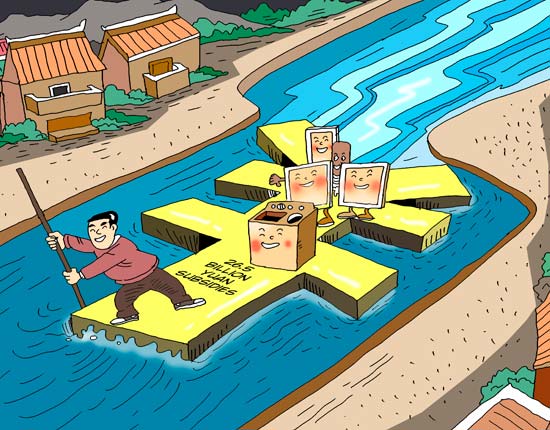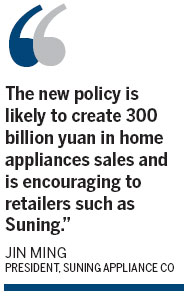Doubts emerge over subsidies sales boost
Updated: 2012-06-04 08:53
By He Wei in Shanghai (China Daily)
|
||||||||
But retailers insist discounts will create rise in demand for appliances
A new wave of subsidies for energy-saving appliances is expected to roll out nationwide after a similar program mostly ended one year ago.
But the market is unsure whether the policy can boost spending in the sector that has just experienced its lowest point in months.
The State Council, China's cabinet, announced on May 16 that the government will allocate 26.5 billion yuan ($4.2 billion) to subsidize the purchase of household electrical appliances for a year.
These include air conditioners, flat-panel television sets, refrigerators, washing machines and water heaters that meet energy-saving standards, according to a statement released after an executive meeting of the State Council presided over by Premier Wen Jiabao.
A rule, jointly released by the Ministry of Finance, the National Development and Reform Commission and the Ministry of Industry and Information Technology on May 28, gave the details, showing people will be subsidized 100 to 400 yuan from the State for their purchase of an energy-saving air conditioner or an energy-saving flat-panel TV for a year starting from June 1.
Other energy-saving white goods will also be included by the State's subsidy policy, although the details have not been unveiled, according to a Beijing News report.
Aside from home appliances, the government will earmark another 2.2 billion yuan to promote the purchase of energy-efficient light bulbs and light-emitting diodes and 6 billion yuan for the buying of vehicles with engine sizes below 1.6 liters.
The new subsidy plan for the purchase of energy-saving home appliances marks an important move by the government to stabilize growth, expand domestic demand and improve energy savings and emission reductions, Minister of Finance Xie Xuren said at a national meeting on a fiscal budget for energy savings and emission reductions.
It was also a critical part of China's implementation of proactive fiscal policies this year, he said.
While details of the plan are yet to be unveiled, it is apparent that compared with the previous such endeavor, the government has expanded the subsidy portfolio and spared more budgets, said Xie Jiyong, an analyst with Capital Securities Corp in Shanghai.
Last time the subsidy applied exclusively to green air conditioners but now five categories of goods enjoy the preferential policy, he said.
Moreover, "the government-funded expenditures have jumped fivefold, compared with the previous incentive that totaled 10 billion yuan over two years", he added. He predicts the policy will raise nationwide home appliances sales by 20 percent.
Three complementary subsidy projects comprise the country's home appliance subsidy pillar that is aimed at spurring domestic consumption and curbing pollution.
In addition to the energy-saving appliances subsidy, the home appliance replacement scheme, which ran through 2009 to 2011, recycled used white goods and entitled buyers in nine provinces and cities to subsidies worth 10 percent of the retail price of televisions, refrigerators, washing machines, air conditioners and computers.
A third related policy, called "home appliances going to the countryside" and set to expire by early next year, guaranteed a 13 percent rebate offered by the government to boost consumption of big-ticket items among the 737 million farmers who live outside the cities.
After the first two subsidy programs came to an end, sales of home appliances in the first quarter of 2011 dipped 0.53 percent year-on-year, air conditioners sales fell 3.2 percent and electrical heaters sank 24.8 percent, according to data from the Ministry of Commerce.
The announcement of the new wave of subsidies boosted the stock market. The next trading day after the announcement, shares in washing machine maker Hefei Rongshida Sanyo Electric Co surged 7.8 percent to 9.17 yuan. Stocks in white goods maker GD Midea Holding Co added 1.8 percent to close at 13.89 yuan.
- Energy-saving streetlights light Xibuhe village, Lijiang city
- Air conditioner sales cool down
- China to float 30 billion yuan in e-savings bonds
- China to boost energy-efficient buildings
- China calls for more energy co-op with Europe
- Vice-Premier urges more energy co-op with Europe
- China seeks to expand green energy ties
- Energy use may be capped for 2015
- All want slice of China's new-energy car market

 Relief reaches isolated village
Relief reaches isolated village
 Rainfall poses new threats to quake-hit region
Rainfall poses new threats to quake-hit region
 Funerals begin for Boston bombing victims
Funerals begin for Boston bombing victims
 Quake takeaway from China's Air Force
Quake takeaway from China's Air Force
 Obama celebrates young inventors at science fair
Obama celebrates young inventors at science fair
 Earth Day marked around the world
Earth Day marked around the world
 Volunteer team helping students find sense of normalcy
Volunteer team helping students find sense of normalcy
 Ethnic groups quick to join rescue efforts
Ethnic groups quick to join rescue efforts
Most Viewed
Editor's Picks

|

|

|

|

|

|
Today's Top News
Health new priority for quake zone
Xi meets US top military officer
Japan's boats driven out of Diaoyu
China mulls online shopping legislation
Bird flu death toll rises to 22
Putin appoints new ambassador to China
Japanese ships blocked from Diaoyu Islands
Inspired by Guan, more Chinese pick up golf
US Weekly

|

|









